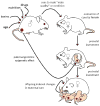Epigenetics and the origins of paternal effects
- PMID: 20620140
- PMCID: PMC2975825
- DOI: 10.1016/j.yhbeh.2010.06.018
Epigenetics and the origins of paternal effects
Abstract
Though there are multiple routes through which parents can influence their offspring, recent studies of environmentally induced epigenetic variation have highlighted the role of non-genomic pathways. In addition to the experience-dependent modification of DNA methylation that can be achieved via mother-infant interactions, there has been increasing interest in the epigenetic mechanisms through which paternal influences on offspring development can be achieved. Epidemiological and laboratory studies suggest that paternal nutritional and toxicological exposures as well as paternal age and phenotypic variation can lead to variations in offspring and, in some cases, grand-offspring development. These findings suggest a potential epigenetic germline inheritance of paternal effects. However, it may be important to consider the interplay between maternal and paternal influences as well as the experimental dissociation between experience-dependent and germline transmission when exploring the role of epigenetic variation within the germline as a mediator of these effects. In this review, we will explore these issues, with a particular focus on the potential role of paternally induced maternal investment, highlight the literature illustrating the transgenerational impact of paternal experiences, and discuss the evidence supporting the role of epigenetic mechanisms in maintaining paternal effects both within and across generations.
Copyright © 2010 Elsevier Inc. All rights reserved.
Figures

References
-
- Abel E. Paternal contribution to fetal alcohol syndrome. Addict Biol. 2004;9:127–33. discussion 135-6. - PubMed
-
- Abel EL, Tan SE. Effects of paternal alcohol consumption on pregnancy outcome in rats. Neurotoxicol Teratol. 1988;10:187–92. - PubMed
-
- Abel EL, Moore C, Waselewsky D, Zajac C, Russell LD. Effects of cocaine hydrochloride on reproductive function and sexual behavior of male rats and on the behavior of their offspring. J Androl. 1989;10:17–27. - PubMed
-
- Abel EL, Bilitzke P. Paternal alcohol exposure: paradoxical effect in mice and rats. Psychopharmacology (Berl) 1990;100:159–64. - PubMed
-
- Allegrucci C, Thurston A, Lucas E, Young L. Epigenetics and the germline. Reproduction. 2005;129:137–49. - PubMed
Publication types
MeSH terms
Grants and funding
LinkOut - more resources
Full Text Sources
Medical

